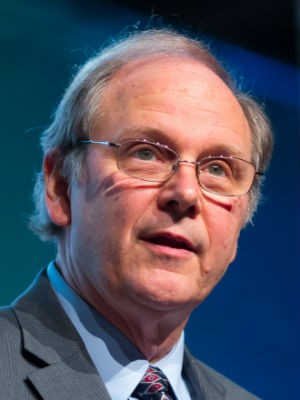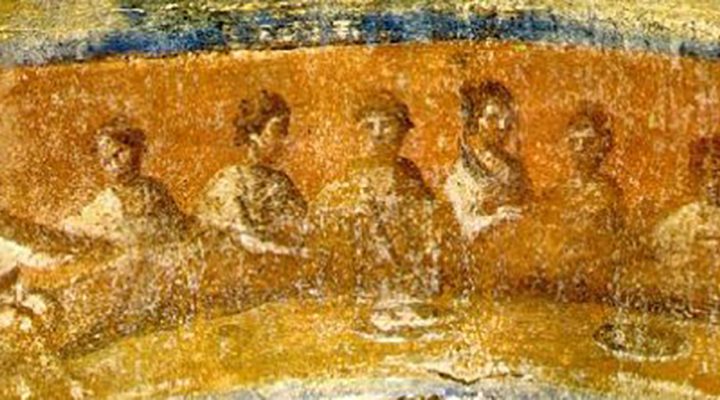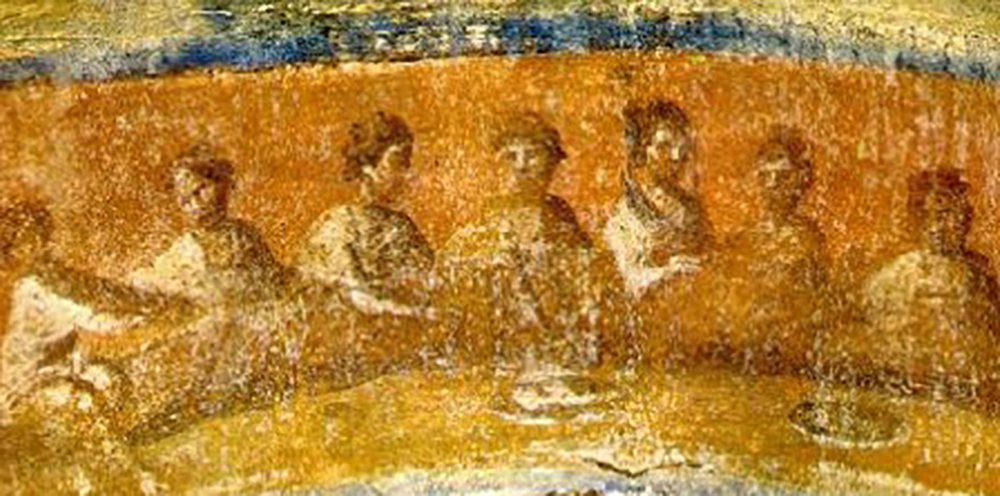I remember when missionary colleagues, just returned from their home leave in Oklahoma, introduced the Bill and Gloria Gaither gospel hymn “The Family of God” to our gathered Baptist personnel in Indonesia. Over the years, the song became so deeply identified with those friends and our mission community that every time we met, whether for prayer retreat or annual meeting, it was as if we were not really together until we sang again those feel-warm lyrics:
You will notice we say brother
And sister ’round here.
It’s because we’re a family
And these folks are so near.
When one has a heartache
We all share the tears,
And rejoice in each victory
In this family so dear
I’m so glad I’m a part
Of the family of God.
I’ve been washed in the fountain,
Cleansed by his blood.
Joint heirs with Jesus
As we travel this sod,
For I’m part of the family,
The family of God.

Robert Sellers
It was typical that as we sang many of us looked around the room at the almost 150 coworkers. For years and sometimes decades, we had joined in important and challenging assignments. We saw those for whom we had prayed and embraced when they had lost parents, spouses or children. We lingered upon the faces of those who had suffered severe and frightening tropical diseases or endured misunderstanding, criticism and rejection from national believers. And we smiled deeply at memories of celebrating all kinds of holy days and holidays with these friends — praying and studying, singing and sharing, laughing and playing. We were family, connected by our common faith identity, life journey and calling to ministry.
I love that missionary family and have worked faithfully to try to keep us all connected throughout our years of retirement. Those relationships are very precious to me and always will be.
But over the years I have begun to believe the “family of God” is more inclusive than I previously assumed. Here are some reasons why.
God is the creative actor in the birthing of all people. The belief in the divine creation of humankind is symbolized in the biblical story of beginnings in Genesis. God is the one who is active in the formation, development and birth of human beings. No Christian I know claims that God is Creator only of persons who will one day become followers of Christ.
“No Christian I know claims that God is Creator only of persons who will one day become followers of Christ.”
Serene Jones, Christian theologian and president of Union Theological Seminary in New York City, writes that when her students are studying the doctrine of humanity and wish to know who they really are, she answers: “You are beloved creatures of God,” a sentence that summarizes how Christians understand the biblical story of humanity’s creation.
Jones explains: “Who or what are we? We are embodied, earthbound, material, living creatures who are created by and belong to a God who loves us dearly and seeks to be in relation with us.”
According to Jones, the conviction that God has created every person means that “all of us, as human beings, exist only by virtue of God’s decision to call us into being, a decision that God freely makes.”
This divine involvement in the birth of humans is true regardless of the faith traditions into which each person is born or the choices made later in life. Thus, Christians are “related” to Muslims, Jews, Hindus, Buddhists and all religious others by virtue of God’s creative activity in each of their lives.
God’s “image” dwells in each person. God’s role in the creation of all persons necessitates that God’s “image,” whatever that may mean, exists in every human being. Again, I do not know of any Christian theology that teaches God’s image is found only in Christians. Indeed, even Calvinists — who in their doctrine of limited atonement assert the choice and predestination by God of those who will one day believe — follow John Calvin’s teaching that all humans are created by God in God’s image.
South African reformed theologian J.M. Vorster writes: “Calvin’s view on the creation of (humankind) in the image of God (imago Dei) and the concept of common grace lies at the root of his view that humans have an inherent God-given dignity. God created (human beings) in (God’s) image. The gift of God’s image is present in every person. Due to this creational principle, (Calvin) stressed the worthiness of (all) human (beings).”
Alister McGrath, Northern Irish Anglican theologian at the University of Oxford, explains: “The fact that humanity is created in the image of God is widely regarded as establishing the original uprightness and dignity of human nature.” McGrath’s book Christian Theology: An Introduction is regarded as the “finest university textbook available” in the field of historical theology. The volume demonstrates the author’s mastery of both doctrine and church history, which leads him to confirm as Christian orthodoxy that the divine image is found in all human beings.
“We are related to all others because we share the same divine image.”
We are related to all others because we share the same divine image. One might say we are kinfolks in the family of God, since we share a DNA connection (“Divine Nature Association”).
We have the same “ancestor” as other humans. Christians, as one of the three Abrahamic religions — so named because all three trace their beginnings to the patriarchal ancestor Abraham — can acknowledge that they are “siblings” of Jews and Muslims. This common patriarch means Christians are in the same family of religions as almost two billion other people in the world, because according to 2022 statistics, there are approximately 1.97 billion Muslims globally and some 15.3 million Jews worldwide.
While almost two billion people, or one-fourth of the world’s entire population, is not an insignificant sample on which to argue our familial relationship to followers of other faiths, what about all the rest of the world’s population who aren’t Jews or Muslims?
Are we also related to followers of those other faiths in a community that can be called the “family of God”? I believe so, because of the divine attribute traditionally known as the “fatherhood of God.”
E.L. Williams was a 20th century evangelical pastor and writer in Australia who, as a conservative Christian, discussed God as the father of all people. He contended of Genesis 1:27 (“So, God created man in his own image, in the image of God, he created him”): “This is not applied to Israel or any particular race or nation or any group. Man as man is made in the image of God. … In the sense of Father-Creator, God is the Father of all men. It was in line with this thought that Paul said: ‘In him we live and move and have our being,’ and he drew on a (Gentile) poet to express the point he was making, ‘For we are indeed his offspring.’”
Furthermore, Williams emphasized that God is indiscriminate when it comes to the treatment of all persons: “’He makes his sun to rise on the evil and on the good and sends rain on the just and on the unjust’ (Matthew 5:45). The fair and loving behavior of a human parent who gives a child bread and fish, and not a stone or snake, can metaphorically represent God who is the eternal loving Father and our common ancestor.”
The genealogy, or family tree, of Jesus in the Gospels illustrates that those who were culturally and religiously different from Jesus were also “related” to him. There are two genealogies in the Gospels, found in Matthew and Luke. Like many of the parallel accounts in these two canonical works, there are significant differences which suggest the distinctive theological point(s) of each writer — or community associated with the evangelists’ names.
Matthew, widely regarded as the most Jewish of the four Gospels, structures his genealogy of Jesus to introduce him as the Son of David and the Messiah (Matthew 1:1, 1:18). Luke, on the other hand, arranges his genealogy around the idea of Jesus as the son of God where the placement of the family tree in the narrative follows the angelic announcement to Mary that her child shall be called the “Son of God.” It also is placed after the baptism of Jesus, where the voice from heaven declares that Jesus is God’s Son, with whom God is well pleased.
Within these two genealogies are evidences that Gentiles are related to Jesus, too. One of the unusual features of Matthew’s version is the presence of the names of four female ancestors of Jesus, in addition to its reference to Mary, his mother. Each of these women was a non-Israelite: Tamar and Rahab were Canaanites, Ruth was a Moabite, and Bathsheba a Hittite. Each of these forebears in the family tree were religiously different from Jesus and his family. While Matthew’s genealogy begins with Abraham, the patriarch, Luke traces the lineage of Jesus all the way back to Adam, who was neither an Israelite nor a Jew.
That these religious others are part of Jesus’ own heritage, according to these Gospel genealogies, is another reason to believe that the “family” of God is inclusive.
“How much more, then, will God accept those who are religiously diverse as members of the family, because of the immeasurable love God has for all of them?”
Perhaps a common illustration will help clarify. Many Christians have siblings or cousins who have married someone of another faith. Those persons always will be included as part of the family. They are accepted, despite their religious difference, because of the affection the family has for them. How much more, then, will God accept those who are religiously diverse as members of the family, because of the immeasurable love God has for all of them?
Jesus, whom many believers like to identify as their “brother,” was a Jew and not a Christian. It seems an obvious proof that the family of God includes those who are not Christians. Jesus is certainly in the “family;” in fact, he is the head of the family. And he was not a Christian, but a Jew. There was no “Christian” religion when Jesus was on earth in the flesh.
Kirby Godsey, former president and chancellor of Mercer University, asks, “Is God a Christian?” in one of his several books about God.
He writes: “Our understanding of God is often informed more by history and tradition than by personal experience. We presume God to be a Christian because we are Christians (just) as Muslims presume Allah (‘God,’ in Arabic) to be Muslim because they are Muslim. We create God in the image of our beliefs. God does not create our beliefs. Our beliefs create God. … You and I and all the people before us have met God in unexpected places. After all, Mohammad was not expecting to meet God in Mecca. Moses was certainly not expecting to meet God in that craggy terrain scorched by the desert sun. And the people of Nazareth were clearly not expecting to meet God in an unemployed carpenter’s son. … God has a habit of showing up in unexpected places.”
I believe one of those unexpected places where God shows up is at the head of that massive heavenly banquet table, where all God’s children who have feared God — in their own understanding of who God is — and done what is right enjoy their place as members of the family of God.
God loves the whole world of people. Why will there be people at the table who are not “Christians”? They will be there because God loves them.
The late Archbishop Desmond Tutu of South Africa published a collection of his “most historic and controversial speeches and writings” in which he declared: “God is clearly not a Christian. His concern is for all his children. There is a Jewish story which says that soon after the episode of the drowning of the Egyptians in the Red Sea, while the Israelites were celebrating, God accosted them and demanded, ‘How can you rejoice when my children have drowned?’
“For God so loved the world,” we like to memorize and quote. I think some Christians, however, think of “the world” as a general category, perhaps putting their prejudice against those who are different squarely upon God. I am reminded of the Charlie Brown cartoon where Linus says, “I love mankind. It’s people I can’t stand.” But God doesn’t love the world in a general way. God loves the specific people in the world — all the people. What else might we expect of our Heavenly Father?
Conclusion
This is the third article in a trilogy of opinion pieces I have written about my commitment to the interfaith movement and to followers of other faiths.
I am a committed Christian with interpretations that are not traditional or orthodox, and yet, “I’m so glad I’m a part of the family of God.” I’m also very thankful to have come to believe that God’s family is more inclusive than we typically have thought. I want to celebrate this perspective of the bigger family of God and a larger heavenly banquet table with others.
Maybe I should start teaching my Christian friends another verse for the Gaither melody:
We can talk about “cousins”
As our kinfolks, too,
It’s because we can now see
God’s family anew.
Connections are many,
Relations not few,
God’s love is inclusive,
That’s biblically true.
I’m so glad I’m a part
Of this family divine.
Diverse and so different
From just “me and mine,”
All those whom God loves
By heavenly design,
This much larger family,
The family divine.
Rob Sellers is professor of theology and missions emeritus at Hardin-Simmons University’s Logsdon Seminary in Abilene, Texas. He is a past chair of the board of the Parliament of the World’s Religions in Chicago. He and his wife, Janie, served a quarter century as missionary teachers in Indonesia. They have two children and five grandchildren.
Related articles:
Six Scriptures undergirding my attitude toward other faiths | Opinion by Robert Sellers
Six lessons learned on my interfaith journey | Opinion by Robert Sellers
Lessons learned on a journey of interfaith friendship | Opinion by Robert Sellers


